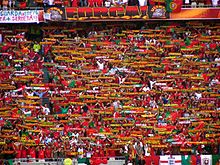Football in Portugal
Initially, football was played between neighbour clubs, but soon enough citywide and regional tournaments started to take place around the nation.Despite the production of footballers such as Eusébio, Luís Figo and Cristiano Ronaldo (Ballon d'Or winners), the Portugal national team have been, for the most part, underachievers at international level when compared to their youth squads, who have won just about every European and world title available.Football started to gain popularity in Portugal in the late 19th century, brought by Portuguese students who returned from England.[4] The three groups began to play several matches against each other and were eventually joined by a team of Braço de Prata, which included several Englishmen and build-up an Invictus status.[4] Then came the presentation of a football team from the Club Tauromático Group, which again included the three brothers Pinto Basto (Guilherme, Eduardo, and Frederico), among others, such as Hugo O'Neil, who had played in the 1888 game.[4] The first cup match in the country was held in Porto on 2 March 1894, and it was attended by King Carlos and Queen Amelia.[10] This is possibly the first match in which extra time was played as the royal couple arrived too late to see the first half and the Queen demanded that the game continue after the end, because she was enjoying it so much.Many top players from the former colonies have represented Portugal at the international level, as well as playing for many clubs in the various tiers of the national and international leagues, most notably in the past the likes of Fernando Peyroteo, Matateu, Hilário, Costa Pereira, Coluna, José Águas, Eusébio, Jordão, Shéu and Abel Xavier.Os Belenenses, Boavista FC, Vitória S.C., and S.C. Braga, have been contenders for the coveted place of fourth biggest club.After the end of World War I, the sprouting of football clubs all over the country gained momentum and, in the 1920s, S.C. Braga, Vitória S.C., Gil Vicente F.C.and S.C. Beira Mar among many others, were founded, further asserting the popularity of the sport wherever it was played, with stadiums filled to maximum capacity.By then, the local talent always wanting to better the opposition further improved the quality of the players' training and tactical strategy awareness by investing and importing top foreign coaching and managerial staff from abroad, resulting in the refinement and improvement of the local game quality being able to stand up to top international levels.Following the retirement of all players from its "golden generation", Portugal, led by manager Fernando Santos, won Euro 2016, defeating hosts France 1–0 in the final.


Estádio da LuzMen's national teamPrimeira LigaCampeonato Nacional FemininoLiga Portugal 2Terceira LigaCampeonato de PortugalTaça de PortugalTaça de Portugal FemininaTaça da LigaTaça da Liga FemininaSupertaça Cândido de OliveiraSupertaça de Portugal FemininaFIFA World CupUEFA European ChampionshipUEFA Nations LeagueFIFA Club World CupUEFA Champions LeagueUEFA Women's Champions LeagueUEFA Europa LeagueUEFA Conference LeagueUEFA Super CupAssociation footballPortuguesesport in PortugalFunchalLisbonCoimbraEnglish merchantsS.L. BenficaFC PortoSporting CPBig ThreeEuropean Cup/UEFA Champions LeagueUEFA Cup/UEFA Europa LeagueEuropean Cup Winners' CupUEFA Intertoto CupIntercontinental Cup/Toyota CupEusébioLuís FigoCristiano RonaldoBallon d'OrPortugal national teamUEFA Euro 2016Francerunners-upGreecethe NetherlandsCamachaMadeiraHarry HintonC.S. MarítimoGuilhermeEduardoFredericoSt George's CollegeCascaisfirst known football match in mainland PortugalCampo PequenobullringClub LisbonenseCarlosCasa Piafirst cup matchKing CarlosQueen Ameliaextra timeSport Clube VianenseMadrid Fútbol ClubeMadridPortalegrePortuguese Football FederationLusotropicalismAntónio SalazarAngolaMozambiqueGuineaCape VerdeS. Tomé and PrincipePortuguese IndiaFernando PeyroteoMatateuHilárioCosta PereiraColunaJosé ÁguasJordãoAbel XavierSporting Lourenço Marques1966 FIFA World CupC.F. Os BelenensesBoavista FCVitória S.C.S.C. BragaAcadémica de CoimbraBoavista F.C.F.C. PortoLeixões S.C.Vitória F.C.C.D. NacionalS.C. OlhanenseS.C. EspinhoPortimonense S.C.Académico de Viseu F.C.Gil Vicente F.C.S.C. Beira MarCarcavelinhosEuropean CupUEFA CupLatin CupList of football clubs in PortugalAroucaBenficaBoavistaChavesEstorilFamalicãoVila Nova de FamalicãoGil VicenteBarcelosMarítimoPaços de FerreiraPortimonensePortimãoRio AveVila do Conde